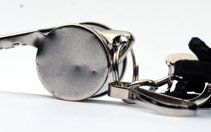Vin Rogue writes ‘A Christmas present that I am currently reading has this article in it by an unknown writer, I found it interesting and wonder what you think to it?’
We provide below another article from Vin Rogue in his ‘Vin Rogue’s Gallery’ series
Time Off
A Christmas present that I am currently reading has this article in it by an unknown writer, I found it interesting and wonder what you think to it? At the end of the article I have put down the publication I am reading!
‘Jones scored the winning goal for City in the second minute of injury time.`
The results of matches are often decided by goals scored during the time added on by referees when the game was held up because a player had to be attended to by the trainer. Is the time added on really the time lost in this way? An investigation into the matter indicates that it is not. It is probably a good deal less in most cases.
The referee is the sole judge of how much time to add on for stoppages. In theory he should stop his watch (one of several he carries) the second that play is held up and set it again when play re-starts. Being human he may forget to do so, and if he remembers later on he may add on what he estimates the time lost. This could be wildly inaccurate. (Ask two or three people to tell you when a minute has gone by, and you`ll probably get some very different replies).
Or he may forget altogether. After all he is a busy man with many functions to perform; endeavouring to ensure that the rules are not broken and, if they are, awarding the appropriate punishment.
His linesmen are no help to him in this particular matter. It is their job to keep an accurate record of 45 minutes` play in each half taken from the kick-off and to signal to the referee when this period of time has elapsed. It is then up to him to add on the time he has clocked up for stoppages.
One way out of this difficulty would be for the whole question of time to be taken out of the hands of both referee and linesmen and given to another official whose responsibility it is to keep an accurate record of the period of play. It would be up to him to signal to the referee when 45 minutes` playing time was up, having already added on injury time. There is no doubt that this would be a better way of doing it and it would relieve the referee of one of his many duties, but do we want yet another official who can only in one sense be said to have ‘a full time job`?
There is another aspect of the question. Spectators who pay to see a football match, said to be of 90 minutes` duration, probably only see about 60 minutes when the ball is actually moving about on the pitch. The rest of the time is spent on throwing it in and putting it in position for goal kicks, corner kicks and free kicks.
It takes about ten seconds to throw the ball in (sometimes a lot more if a team is hard pressed) and there are dozens of them in every game. Placed kicks take twice as long on average. A goal means that play is held up for about half a minute, but there are not so many of them and spectators don`t mind losing that amount of time, especially when the home side scores.
It follows that one game may have as much as ten minutes more playing time than another because there were fewer throw-ins, placed kicks and infringements of the rules.
Is there a case for standardising the period of play by using an automatic clock such as that used in ice-hockey, for instance? It would stop automatically when the ball was out of play for any reason and if a match was scheduled for, say 60 minutes, it would go on for exactly that period of time – no more and no less.
There would then be no point in players kicking the ball out of play deliberately, making a fuss about minor injuries or indulging in any time-wasting activities. The clock is boss; spectators get what they pay for- a concept that appeals to modern thinking.
At a time when computers are rapidly dominating our lives, haphazard methods of management are universally condemned – even when the industry concerned is supposed to be for leisure and pleasure.
Traditionalists may point out drawbacks. Injuries would probably be treated on the pitch since they would not be holding up play. Stoppages would be longer; with one trainer on, the other would find someone to attend to, managers would take the opportunity of a tactical talk. The game would certainly lose one of its principal attractions – play going on continuously, more or less.
Perhaps soccer can hold out a little longer. After all, the way the F.A. Cup draw is made must make every systems analyst cry out in despair.
VinRogue
..and the source of the article?
Unknown writer in “The Boys Book of Soccer 1971′. Yes, this was written 40 years ago! I must thank my son who found it in a Charity Shop and bought it for peanuts. Ralph Coates, Frank Casper and a few others all get great mentions.




I think it is time to drag football kicking and screaming into the 21st century. I am all for goalline technology and anything that removes human error and the element of of doubt from the game. Yeah make the Refs job easier so he can concentrate on the important stuff. How many times do we still say where the hell did he get four minutes of added time from? You can’t argue with an accurate timing mechanism! 40 years later AND we are still debating it? Amazing! Thanks for the article VR [Edited by turfmanphil]
Since we’re debating the elasticity of time, how come the games in Scotland end on average maybe a minute or more earlier than games in England? Is it because the Scottish refs are tougher on getting the second half started on schedule? I had thought it must be. But then why do Scottish first halfs end earlier than England’s? Anyway, back to the main debate. American Football is a game ruled by an impartial clockwatcher. As Vin’s anonymous author suspected, this results in lots of small delays, to the extent that the clock has to regulate those too, with fixed time allocations for huddles, time outs, restarts and so on. Now that Fox have introduced The Red Zone, several of my American friends say they can’t believe they used to watch the games in “slow time”, and have become addicted to The Red Zone’s simultaneous coverage of 8 or 9 games, with almost all of the action coming in real time, and some occasional snippets a few seconds late. I confess that now it’s available on SKY too, I have started going over to the NFL after Sunday afternoon PL games. But you’ll have to wait for next season! There’s only one game left this year… the ultra slow slow slow time Superbowl. Can’t be bothered myself, after the team from Baltimore, where I lived for 12 years, and which is where Lee Hoos is from, lost in the slow slow time semi to the Patriots, with the Baltimore kicker missing a late and easy field goal (I think) to put the game into overtime, after I had dozed off in the first half. (Blame the beers brought round by Ars fans to watch them lose to MU!) So… be careful what you wish for, clockwatchers!
Many things in football annoy me, Stoke City can take 20 seconds over each long throw, towel etc. What I want is for teams beating Stoke to take 20 seconds over all their throw ins, time wasting, oh yes please if only to get the point over about how annoying it is. Who ever wrote this had the vision to see a 4th official too.
Why not take on the RU method. A clock everyone can see and a very loud hooter. It is a long time since I saw the ref call time when the ball was in apenalty area or even on its way into the goal. Refs are taking the easy option, ball in no man’s land, blow the whistle, no controversy.
Just thought about the Derby game, they wasted time playing against the wind from the first goal kick. If we had a system whereby games were 40 minutes each half but time stopped when the ball was dead what time would I get home? 🙂